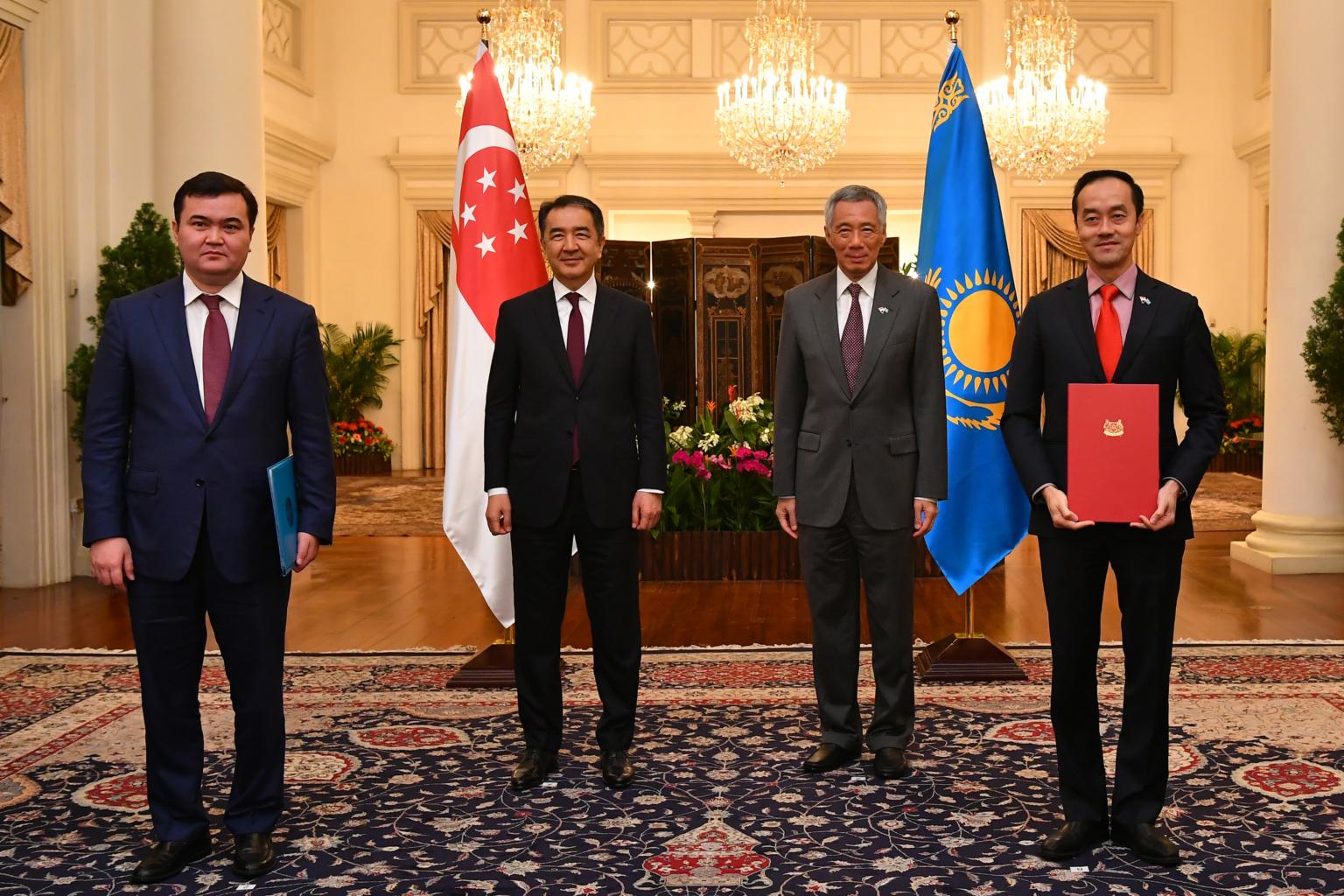Singapore and Kazakhstan ink bilateral investment treaty
Sign up now: Get ST's newsletters delivered to your inbox

(From left) Minister of Investments and Development of the Republic of Kazakhstan, His Excellency Zhenis Kassymbek, His Excellency Bakytzhan Sagintayev, Prime Minister of the Republic of Kazakhstan, Prime Minister Lee Hsien Loong and Senior Minister of State, Ministry of Trade and Industry, Koh Poh Koon holding the Agreement on the Promotion and Mutual Protection of Investments at the Istana on Nov 21, 2018.
ST PHOTO: LIM YAOHUI
SINGAPORE - Singapore and Kazakhstan aim to strengthen their economic partnership, Emeritus Senior Minister Goh Chok Tong said on Wednesday (Nov 21), as the two countries signed a bilateral investment treaty (BIT).
The agreement was exchanged by Senior Minister of State for Trade and Industry Koh Poh Koon and Kazakhstan Minister for Investment and Development Zhenis Kassymbek, in the presence of Prime Minister Lee Hsien Loong and Kazakhstan Prime Minister Bakytzhan Sagintayev at the Istana.
The treaty will support greater investment flows between both countries through protecting the interests of investors from Singapore and Kazakhstan and providing them with more confidence to seize investment opportunities.
It will grant investors from both countries non-discriminatory treatment compared to other foreign investments, fair and equitable treatment and full protection and security based on customary international law protection from illegal expropriation and freedom to transfer capital and returns in and out of country, among other terms.
At the Kazakhstan-Singapore Business Forum held at Shangri-La hotel on Wednesday, Mr Goh said: "The BIT will complement the existing Avoidance of Double Taxation Agreement, which reduces the tax burden for companies and relieves double taxation of income earned by our citizens.
"We should continue to work on establishing government-to-government agreements to strengthen the bilateral economic infrastructure. This would help to facilitate companies venturing into our respective markets and further strengthen regional cooperation."
Dr Koh added: "Kazakhstan's rapidly improving economic reforms, highly literate workforce and growing urban middle class present opportunities for Singapore companies. I strongly encourage our companies to venture into Kazakhstan and the rest of Central Asia."
Another 12 agreements were signed at the business forum to establish partnerships in areas such as information and communication technology, food and education.
Kazakhstan is a key player in the Eurasian region, connecting the East and West.
Last year, total bilateral trade in goods between Singapore and Kazakhstan was $133.6 million. Singapore's imports from Kazakhstan amounted to $110.7 million, while Singapore's exports to the country stood at $23 million.
Trade in services between Singapore and Kazakhstan amounted to $40 million in 2016.
As of 2016, Kazakhstan's cumulative foreign direct investment in Singapore amounted to $2.5 billion, mainly in the financial and insurance services sector, while Singapore has invested $180 million in Kazakhstan.
Mr Goh added that Singapore companies can contribute niche expertise to key Kazakh industries. For example, urban and infrastructure consultancy Surbana Jurong has been involved in several master planning projects, including the development of petrochemical clusters.
Mr Sagintayev agreed and said that Singapore businesses can look at sectors such as information technology, transport and logistics and housing and construction.
On the other hand, Kazakhstan businesses can also use Singapore as a launchpad into the rest of Asia. Mr Goh said: "Singapore is situated strategically in the region, and is a leading global trading and financial centre... We welcome more Kazakh businesses to join the 100 companies that have already based themselves here."
Chief executive officer of Kazakh Invest Saparbek Tuyakbayev added that more businesses in Kazakhstan can look to Singapore and vice versa.
He said: "Kazakhstan is at the centre of some of the largest markets, such as Russia, China and Europe. It is also business-friendly, ranked at 28 in the World Bank index for doing business. There are strong, well-established sectors that investors can venture into, such as the food industry, mining, petrochemicals and machinery."
One business that has ventured into Kazakhstan is engineering consultancy Meinhardt. In June this year, Meinhardt agreed to provide a technical review of the systems for the Astana LRT Project. It then set up a branch office in capital Astana.
Meinhardt Group chief executive officer Omar Shahzad said: "Given Kazakhstan's strategic location, strong infrastructure and political stability over the years, we saw the country as an ideal location for our 48th regional office to participate in the economic development of the country and to unlock the untapped potential in Central Asia."
He said that a challenge businesses might face is understanding how things are done in Kazakhstan, but added: "Perhaps the best advice we can offer to Singapore companies looking to enter Kazakhstan is to not get too entrenched in how things are done in Singapore, and to be flexible enough to adapt quickly to how things are done in Kazakhstan."


